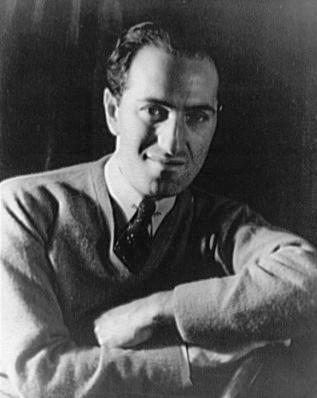
George Gershwin was an American composer and pianist whose compositions spanned popular, jazz and classical genres. Among his best-known works are the orchestral compositions Rhapsody in Blue (1924) and An American in Paris (1928), the songs "Swanee" (1919) and "Fascinating Rhythm" (1924), the jazz standards "Embraceable You" (1928) and "I Got Rhythm" (1930), and the opera Porgy and Bess (1935), which included the hit "Summertime".
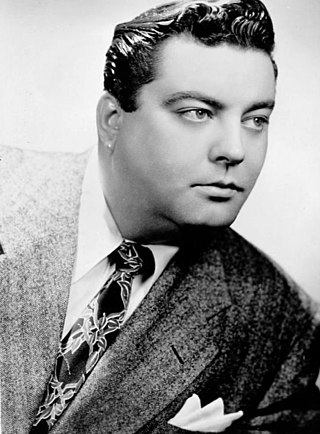
John Herbert Gleason, known as Jackie Gleason, was an American actor, comedian, writer, and composer also known as "The Great One". He developed a style and characters from growing up in Brooklyn, New York, and was known for his brash visual and verbal comedy, exemplified by his city bus driver character Ralph Kramden in the television series The Honeymooners. He also developed The Jackie Gleason Show, which maintained high ratings from the mid-1950s through 1970. The series originated in New York City, but filming moved to Miami Beach, Florida, in 1964 after Gleason took up permanent residence there.

The Goldwyn Follies is a 1938 Technicolor film written by Ben Hecht, Sid Kuller, Sam Perrin and Arthur Phillips, with music by George Gershwin, Vernon Duke, and Ray Golden, and lyrics by Ira Gershwin and Sid Kuller. The Goldwyn Follies was the first Technicolor film produced by Samuel Goldwyn.
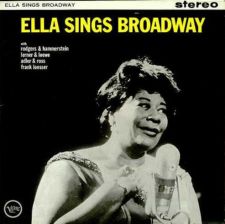
Ella Sings Broadway is a 1963 studio album by the American jazz singer Ella Fitzgerald, with an orchestra arranged and conducted by Frank DeVol. Shortly before the sessions for Ella Sings Broadway, Ella had recorded two singles with Marty Paich, the Antonio Carlos Jobim song 'Desafinado' and a Bossa Nova version of the jazz standard 'Stardust'. This prompted many Ella Fitzgerald fans and scholars to conclude that these sessions were also led by Paich. However, the original scores and parts exist in Ella Fitzgerald's library and it was determined that all the music was arranged by Frank DeVol. In fact, DeVol had previously worked with Ella Fitzgerald having written arrangements for Hello Love (1957), Get Happy (1957), Live Someone in Love (1957), Ella Sings Sweet Songs For Swingers (1958), and Ella Wishes You A Swinging Christmas (1960).
"They Can't Take That Away from Me" is a 1937 popular song with music by George Gershwin and lyrics by Ira Gershwin. It was introduced by Fred Astaire in the 1937 film Shall We Dance and gained huge success.

The Complete Ella Fitzgerald Song Books were a series of eight studio albums released in irregular intervals between 1956 and 1964, recorded by the American jazz singer Ella Fitzgerald, supported by a variety of orchestras, big bands, and small jazz combos.

Ella Fitzgerald Sings the George and Ira Gershwin Song Book is a box set by American jazz singer Ella Fitzgerald that contains songs by George and Ira Gershwin with arrangements by Nelson Riddle. It was produced by Norman Granz, Fitzgerald's manager and the founder of Verve Records. Fifty-nine songs were recorded in the span of eight months in 1959. It is one of the eight album releases comprising what is possibly Fitzgerald's greatest musical legacy: Ella Fitzgerald Sings The Complete American Songbook, in which she recorded, with top arrangers and musicians, a comprehensive collection of both well-known and obscure songs from the Great American Songbook canon, written by the likes of Cole Porter, Rodgers & Hart, Irving Berlin, Duke Ellington, George and Ira Gershwin, Harold Arlen, Jerome Kern, and Johnny Mercer.
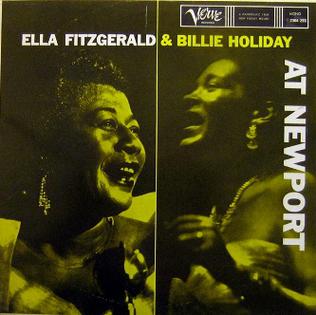
Ella Fitzgerald and Billie Holiday at Newport is a 1958 live album by Ella Fitzgerald and Billie Holiday, recorded at the 1957 Newport Jazz Festival.
"But Not for Me" is a popular song originally written by George Gershwin and Ira Gershwin for the musical Girl Crazy (1930).
"Embraceable You" is a jazz standard song with music by George Gershwin and lyrics by Ira Gershwin. The song was written in 1928 for an unpublished operetta named East Is West. It was published in 1930 and included in that year's Broadway musical Girl Crazy, performed by Ginger Rogers in a song and dance routine choreographed by Fred Astaire.

"Somebody Loves Me" is a popular song, with music written by George Gershwin, and lyrics by Ballard MacDonald and Buddy DeSylva. The song was published in 1924 and featured in George White's Scandals of 1924.
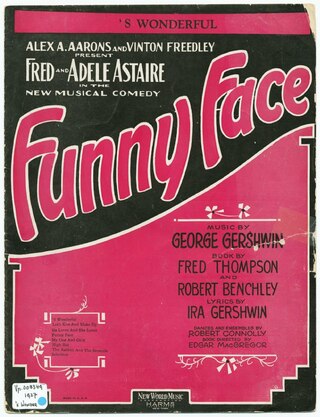
"'S Wonderful" is a 1927 popular song composed by George Gershwin, with lyrics written by Ira Gershwin. It was introduced in the Broadway musical Funny Face (1927) by Adele Astaire and Allen Kearns.
"I've Got a Crush on You" is a song composed by George Gershwin, with lyrics by Ira Gershwin. It is unique among Gershwin compositions in that it was used for two different Broadway productions: Treasure Girl (1928), when it was introduced by Clifton Webb and Mary Hay, and Strike Up the Band (1930), when it was sung by Doris Carson and Gordon Smith. It was later included in the tribute musical Nice Work If You Can Get It (2012), in which it was sung by Jennifer Laura Thompson. When covered by Frank Sinatra he was a part of Columbia Records.
"A Foggy Day" is a popular song composed by George Gershwin, with lyrics by Ira Gershwin. The song was introduced by Fred Astaire in the 1937 film A Damsel in Distress. It was originally titled "A Foggy Day " in reference to the pollution-induced pea soup fogs that were common in London during that period, and is often still referred to by the full title.
The commercial recording by Astaire for Brunswick was very popular in 1937.
"I Was Doing All Right" is a song composed by George Gershwin, with lyrics by Ira Gershwin. It was introduced by Ella Logan in the 1937 film The Goldwyn Follies.
"Love Walked In" is a song composed by George Gershwin, with lyrics by Ira Gershwin. The tune was composed in 1930, but the lyric was not written until 1937, for the movie musical The Goldwyn Follies (1938), where it was sung by Kenny Baker. Hit versions include Sammy Kaye (1938), The Hilltoppers (1953), Ella Fitzgerald (1959), The Flamingos (1959) and Dinah Washington (1960). Artie Shaw recorded the song in the early 1940s.
"I Can't Get Started", also known as "I Can't Get Started with You" or "I Can't Get Started (With You)", is a popular song. It was written in 1936 by Vernon Duke (music) and Ira Gershwin (lyrics) and introduced that year in the revue Ziegfeld Follies of 1936, where it was performed by Bob Hope and Eve Arden.

When Harry Met Sally... is the soundtrack to the movie When Harry Met Sally... starring Billy Crystal and Meg Ryan. The songs are performed by pianist Harry Connick Jr., who won the Grammy Award for Best Jazz Male Vocal Performance.

Songs for Distingué Lovers is an album by jazz singer Billie Holiday, released in 1958 on Verve Records. It was originally available in both mono and stereo. It was recorded at Capitol Studios in Los Angeles from January 3 to January 9, 1957, and produced by Norman Granz.

The collaborations between Ella Fitzgerald and Louis Armstrong have attracted much attention over the years. The artists were both widely known icons not just in the areas of big band, jazz, and swing music but across 20th century popular music in general. The two African-American musicians produced three official releases together in Ella and Louis (1956), Ella and Louis Again (1957), and Porgy and Bess (1959). Each release earned both commercial and critical success. As well, tracks related to those albums have also appeared in various forms in multi-artist collections and other such records.












